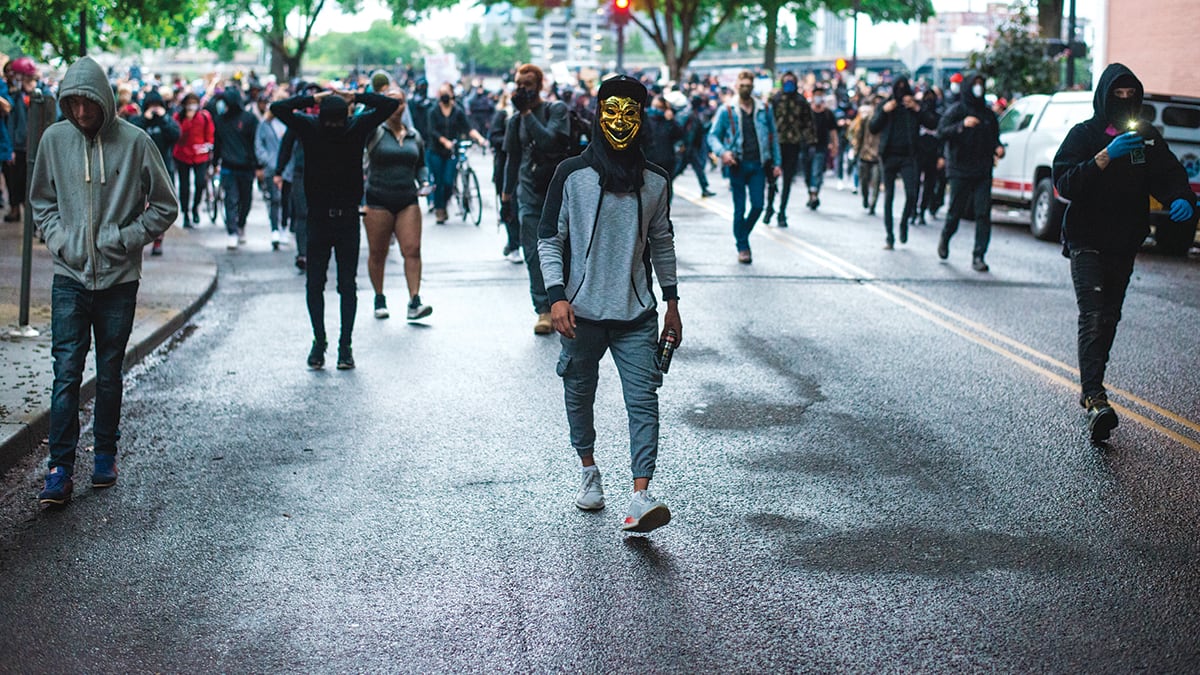Exactly one year ago, shortly before he lost reelection, then-President Donald Trump warned Americans that Democrats would make the nation look like Portland. “The entire city is ablaze all the time,” he lied.
At the time, Portlanders responded on social media with bucolic images of bungalows. But the chaotic, troubled image of the city has prevailed here at home, too.
In polling last month, Portland firm DHM Research found that just 45% of Oregonians statewide have a positive impression of Portland. That’s in contrast to megacorporation Amazon, which boasts 70% positive impressions. Outside the Willamette Valley and Portland metro area, just 35% of Oregonians view the City of Roses positively. Within the metro area, it’s better—53%—but that means barely half of the people living in or near Portland actually like Portland.
“There’s been a concerted effort on the right to make Portland a poster child for everything that they hate, and that continues to play out,” says political consultant Jake Weigler. “Look back to the racial justice uprisings of last summer. For one part of Oregon, they were framed in terms of the history of racial inequity and the need for police accountability, and for the others they were described as anarchy and lawlessness.”
Multiple public opinion professionals point to the protests, a rise in murders, and the increase of homelessness and trash downtown during the pandemic as factors that shaped national and state perceptions.
Travel Portland, the city agency that tracks Portland’s rise and fall in the popular imagination, admits the past two years have been less than positive for the city’s image.
“Travel Portland doesn’t release [results of] consumer sentiment surveys, but we do know there has been a lot of negative news coverage of the livability issues we’ve been facing for two years,” says Marcus Hibdon, the agency’s spokesman. “It’s highly likely that most consumers in the United States have seen some negative message about Portland in the last 18 months. It’s primarily been coverage of the protests, rising crime rates, and other issues involving the Police Bureau.”
Related: Five maps of Portland’s cultural oddities show how we’re different from Seattle and San Francisco.
The idea that Portland is a capital of combative liberals is hardly new. We live in a town that once became famous as “Little Beirut” because it was such hostile territory for visiting Republican presidents.
But it may now be a place that’s difficult for Democratic leaders to visit.
This summer, when 96 Multnomah County residents died in 116-degree temperatures, becoming arguably the city’s first victims of climate change, President Joe Biden did not appear. He later visited the hurricane damage in Louisiana and in New York—both of which experienced far fewer deaths than Portland endured from extreme weather—to make the case for climate infrastructure. Heat doesn’t come with the TV-ready backdrop of hurricane damage, and it’s not clear that any Oregon politicians would be persuaded by a presidential visit to vote for his spending bill.
Political consultant Kevin Looper of People for Portland, which advocates more police, more funding for Portland Street Response, more shelters and a requirement that homeless people use shelters, says he doesn’t know why Biden didn’t appear. But he did hear from the campaign last year.
“I was informed in real time that the Biden campaign saw Portland as a clear negative for Democrats in their polling, which is why it was raised in the presidential debate by Trump,” he says. “That was tied to the national perception of Portland as a symbol of out of control protests. Since then, we’ve added unprecedented homelessness, uncontrolled trash and an epidemic of murder to our national image.”
Portland may also become a problem for Democrats closer to home.
John Horvick of DHM says he added the Portland question to the poll last month because he was seeing Oregon Republicans take aim at the city in their campaign launches.
“I think they’re going to run against the governor. Even though she’s not running for election, they’ll still run against her,” he says. (Brown now has record-high unfavorables: 58%.) Since Brown is a Portlander, that pairs neatly with another message: “They’re running against Portland and they’re running against crime.”
Portland is a downer for Democrats, others agree. And the most prominent candidate officially in the governor’s race—House Speaker Tina Kotek—represents North Portland in the Oregon Legislature.
“Oregonians strongly believe the state is headed in the wrong direction, and polling shows that is largely driven by negative perceptions of what’s happening in Portland,” says Looper, a longtime Democratic operative who recently split with some of his progressive clients. “Insider candidates running for governor will all have to explain why they haven’t done more to change that.”

